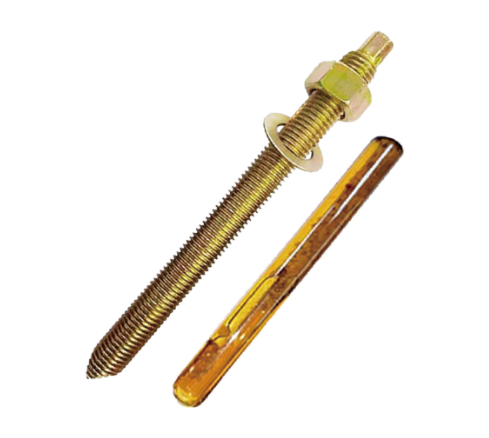Understanding Durable Stainless Steel Chemical Anchor Bolts: A Comprehensive Guide for Professionals
Durable stainless steel chemical anchor bolts are critical components in the realm of fastening and connecting machinery and structures. They are designed to provide robust and long-lasting performance, especially in environments where corrosion resistance is paramount. The unique properties of stainless steel, combined with the specific design of chemical anchor bolts, make them ideal for various
Jul 08,2025

Durable stainless steel chemical anchor bolts are critical components in the realm of fastening and connecting machinery and structures. They are designed to provide robust and long-lasting performance, especially in environments where corrosion resistance is paramount. The unique properties of stainless steel, combined with the specific design of chemical anchor bolts, make them ideal for various industrial applications.
Chemical anchor bolts are typically used in situations where traditional mechanical anchors may not perform adequately. These bolts are embedded in a pre-drilled hole filled with a chemical adhesive, which cures and creates a strong bond with both the bolt and the surrounding substrate. This method not only enhances the holding power of the anchor bolt but also makes it suitable for use in challenging materials such as concrete, brick, or masonry.
One of the primary advantages of using durable stainless steel for chemical anchor bolts is its corrosion resistance. Unlike standard steel, which can rust and degrade over time when exposed to moisture and chemicals, stainless steel has a protective layer that allows it to withstand harsh environments. This characteristic is particularly beneficial in applications subjected to extreme weather conditions, chemical exposure, or in marine environments where saltwater can accelerate deterioration.
Furthermore, the mechanical properties of stainless steel, including its strength and durability, ensure that these chemical anchor bolts can handle high loads and resist shear and tension forces effectively. This makes them suitable for securing heavy machinery, structural supports, and other critical components within various industrial sectors, including construction, manufacturing, and infrastructure.
In addition to their strength and corrosion resistance, durable stainless steel chemical anchor bolts are also designed for easy installation. The use of a chemical adhesive allows for more flexible positioning and can help reduce the overall number of anchors required for a particular application. This can streamline the installation process and potentially reduce labor costs.
It is essential to select the right type of chemical anchor bolt for specific applications, considering factors such as load requirements, environmental conditions, and the materials involved. Professionals in the industrial sector should also ensure that the correct installation techniques are followed to maximize the performance and longevity of these fasteners.
In conclusion, durable stainless steel chemical anchor bolts offer a reliable solution for fastening needs in various industrial applications. Their unique combination of strength, corrosion resistance, and ease of installation makes them a preferred choice for engineers and construction professionals looking to enhance the durability and safety of their projects. By understanding the benefits and applications of these innovative fasteners, professionals can make informed decisions to ensure the success of their projects.
Chemical anchor bolts are typically used in situations where traditional mechanical anchors may not perform adequately. These bolts are embedded in a pre-drilled hole filled with a chemical adhesive, which cures and creates a strong bond with both the bolt and the surrounding substrate. This method not only enhances the holding power of the anchor bolt but also makes it suitable for use in challenging materials such as concrete, brick, or masonry.
One of the primary advantages of using durable stainless steel for chemical anchor bolts is its corrosion resistance. Unlike standard steel, which can rust and degrade over time when exposed to moisture and chemicals, stainless steel has a protective layer that allows it to withstand harsh environments. This characteristic is particularly beneficial in applications subjected to extreme weather conditions, chemical exposure, or in marine environments where saltwater can accelerate deterioration.
Furthermore, the mechanical properties of stainless steel, including its strength and durability, ensure that these chemical anchor bolts can handle high loads and resist shear and tension forces effectively. This makes them suitable for securing heavy machinery, structural supports, and other critical components within various industrial sectors, including construction, manufacturing, and infrastructure.
In addition to their strength and corrosion resistance, durable stainless steel chemical anchor bolts are also designed for easy installation. The use of a chemical adhesive allows for more flexible positioning and can help reduce the overall number of anchors required for a particular application. This can streamline the installation process and potentially reduce labor costs.
It is essential to select the right type of chemical anchor bolt for specific applications, considering factors such as load requirements, environmental conditions, and the materials involved. Professionals in the industrial sector should also ensure that the correct installation techniques are followed to maximize the performance and longevity of these fasteners.
In conclusion, durable stainless steel chemical anchor bolts offer a reliable solution for fastening needs in various industrial applications. Their unique combination of strength, corrosion resistance, and ease of installation makes them a preferred choice for engineers and construction professionals looking to enhance the durability and safety of their projects. By understanding the benefits and applications of these innovative fasteners, professionals can make informed decisions to ensure the success of their projects.
ANTERIOR:

 中文版
中文版 English
English Русский
Русский عربي
عربي





